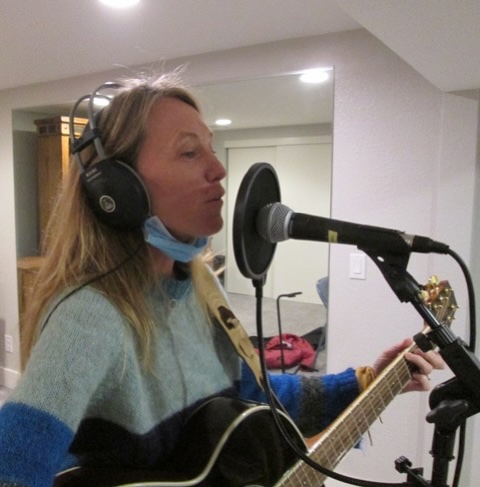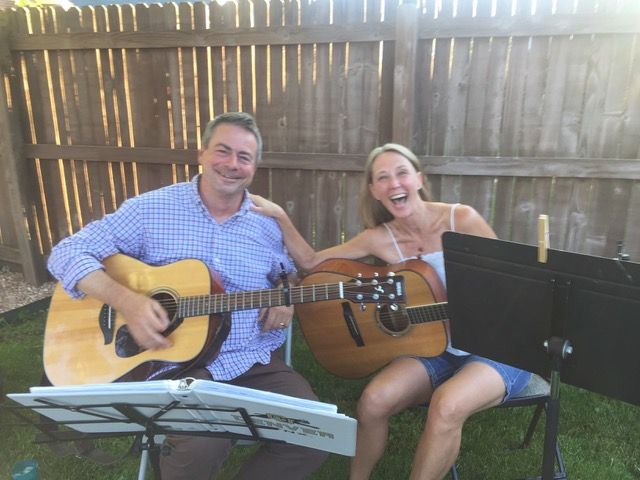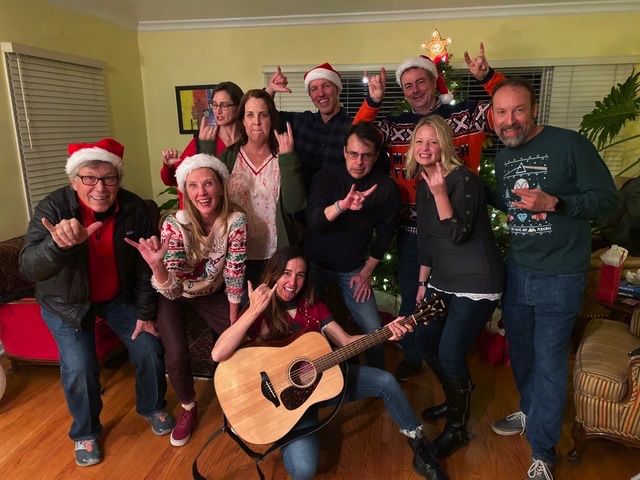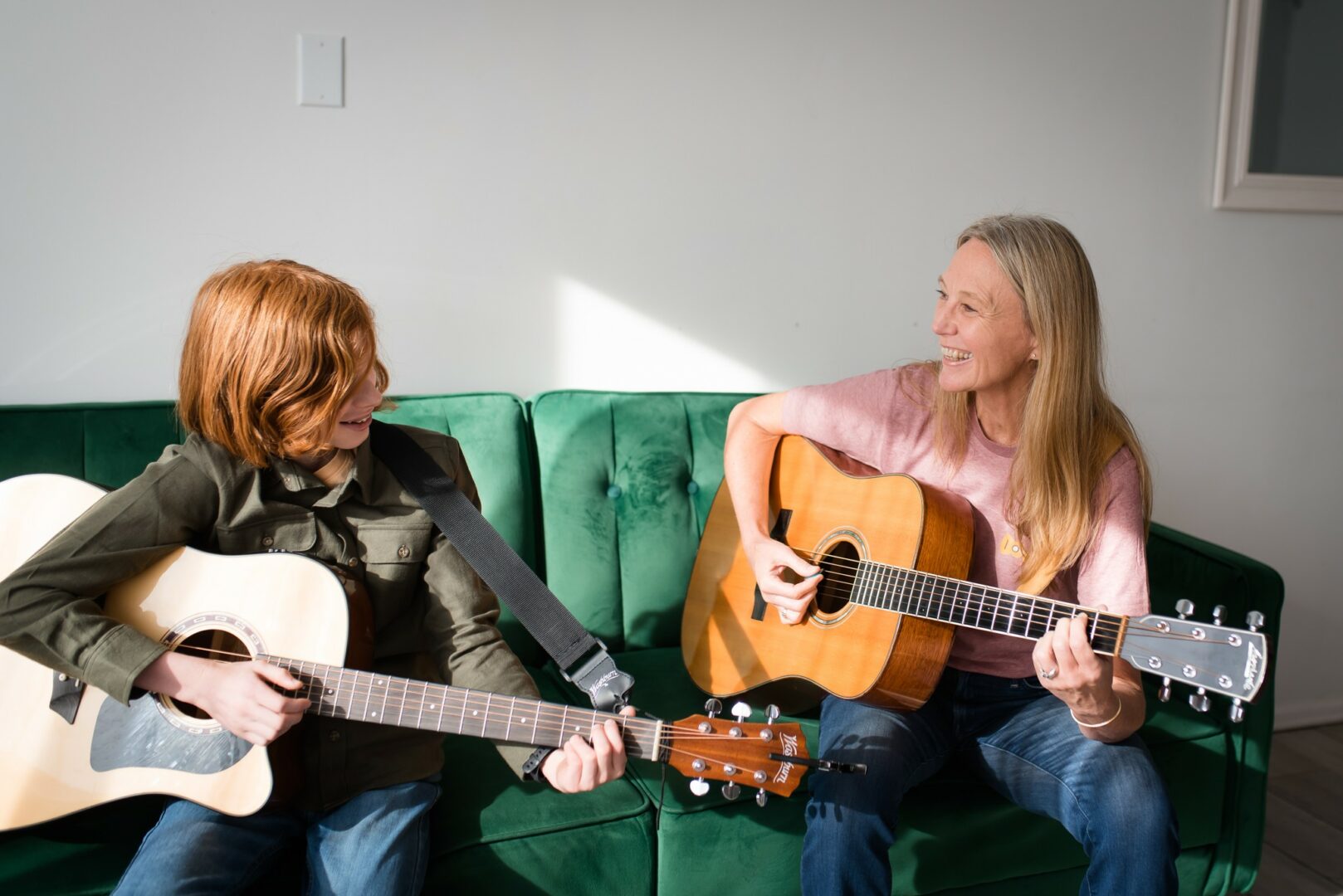Alright – so today we’ve got the honor of introducing you to Robyn Dino. We think you’ll enjoy our conversation, we’ve shared it below.
Robyn, so great to be with you and I think a lot of folks are going to benefit from hearing your story and lessons and wisdom. Imposter Syndrome is something that we know how words to describe, but it’s something that has held people back forever and so we’re really interested to hear about your story and how you overcame imposter syndrome.
Imposter syndrome is a challenge I face. Here is my story and tips that help me and may help you.
One of my first open mic nights was at the Bug Theatre, which had a packed house. Over a hundred people attended, and the stage was big and bare. After much deep breathing in the backroom, I came on stage and forgot the words to the song “Peaceful Easy Feeling” by the Eagles. I quickly recovered and immediately had the audience sing out the first line, and I joined in. What was a horrible moment for us all became a united moment of kinship, music, and community.
My path to becoming a guitar and ukulele teacher isn’t what many would consider the traditional path. I learned to play guitar later in life and fell in love with the feeling it gave me. Although I felt I wasn’t a particularly talented student and struggled, playing guitar became integral to my life. Soon, I was teaching small groups with the training of my mentor and teacher.
My teaching career was born. I opened my own small business, Red Robyn Guitar, and added private lessons in my home, eventually teaching adults and children and adding ukulele lessons.
Imposter syndrome hasn’t disappeared for me—it’s a process. But I’ve found strategies to quiet the inner critic and step confidently into my role as a teacher and musician. Here’s what I’ve learned:
Commit To and Show Up for Things Even When You Are Fearful. I push myself to get in front of others. I was a member of a paid, working band and promoted us in the community and booked our public performances. I was nervous, and my imposter syndrome told me I was not good enough, but we only get good by doing things outside of our comfort zone.
Temper Perfectionism. Our own personal judgment can be harsh. It helped me to make it more about the process. Ask yourself if your inner voice is motivating you or damaging you. Try to make friends with the former and call out the latter.
Humbly Take the Seat of the Expert. I’ve learned that expertise isn’t about knowing everything—it’s about knowing enough to help others. You have things to teach others. You are the perfect teacher for many. I try to honor my teaching style, my compassion and patience, and my commitment to lifelong music learners.
Listen To Others You Admire When They Tell You How Good You Are. Believe them. I look at the results of my business and listen to the positive feedback I receive. There is a reason many of my students have been with me for years.
Find a Trusted Mentor or Friend and Share Your Insecurities with Them. Let them be your mirror. Join in community with others for support and to support. Share your triumphs and setbacks. You may be surprised that people you admire also struggle with imposter syndrome.
Continue To Learn. Find areas where you continue to grow. I take guitar and ukulele lessons to keep moving forward in my musical journey and to inform my teaching. I don’t allow myself to get stale or bored. If you can, take leadership roles.
Believe You Have Something to Offer that Enriches Another’s Life.
You are changing lives. You are changing the course of someone’s day. You are helping redefine how someone sees themselves. You are connecting with another person. You are here to serve. There are so many ways you positively impact others.
Show Up, Imperfections and All You don’t have to be the best—what matters is that you show up. I’ve learned that the value lies not just in the moment but in the effort leading up to it. Whether I’m performing at an open mic or teaching a lesson, I remind myself that the process—practicing, preparing, and improving—is what matters most.
Drop Comparison Comparison is the killer of joy. It can stifle risk-taking and crush dreams before they even have a chance to grow. I’ve learned that comparing myself to others—whether it’s their musical talent, teaching style, or achievements—only robs me of the pride I could feel in my own journey.
Imposter syndrome may never fully go away, but each step you take toward your goals is a step toward silencing it. My biggest weakness—struggling as a late-blooming guitar player—became my greatest strength as a teacher. I understand the frustration of starting from scratch, and I teach in a way that’s approachable and supportive.
If you’re battling imposter syndrome, remember this: You have something to offer. You are enough. And when you show up, imperfections and all, you create moments that matter—not just for yourself, but for others.

Great, so let’s take a few minutes and cover your story. What should folks know about you and what you do?
My expertise is teaching beginner and intermediate players. I have a small at-home studio in Denver, Colorado, for those who love to learn in person. However, I will start offering online lessons in 2025. So, if you are interested in learning but don’t have the time to drive to a lesson in person or live in another zip code or state, online lessons could be for you!
Excitement builds for me when I see my students performing for their families, friends and community, pushing themselves out of their comfort zone. I host a recital every year where my students prepare with focus and anticipation. Upon completion, there is such a feeling of accomplishment and excitement. It is a joyful experience for everyone.
I hope to have students form bands, duets, and trios this year. The synergy and musicianship that comes with playing with others is unmatched.

Looking back, what do you think were the three qualities, skills, or areas of knowledge that were most impactful in your journey? What advice do you have for folks who are early in their journey in terms of how they can best develop or improve on these?
Learning an instrument can be challenging, but it’s also a journey that can be a “heck of a lot of fun”. I believe fun is an essential part of the process for many to stay with guitar or ukulele.
One of my greatest strengths as a teacher is introducing the guitar and ukulele to total beginners. I specialize in teaching through song—especially songs that hold personal meaning for the learner. This approach not only keeps lessons engaging but also helps students connect emotionally with their learning experience.
I strive to normalize the ups and downs of learning an instrument. Acknowledging that certain aspects can be difficult—even for others—can be incredibly reassuring. It’s empowering for learners to know they’re not alone in facing these challenges.
Another key part of my teaching philosophy is breaking things down into manageable steps. By focusing on small, achievable goals, I help my students build confidence and experience consistent success, making their progress steady and satisfying.

All the wisdom you’ve shared today is sincerely appreciated. Before we go, can you tell us about the main challenge you are currently facing?
One of my challenges is connecting with other guitar and ukulele teachers to share information. While there are many groups for piano teachers, there are not many for guitar/ukulele teachers that I have found. In 2025, I may start my own group.
Contact Info:
- Website: https://www.redrobynguitar.com
- Instagram: https://instagram.com/redrobynguitar


Image Credits
Tanya Butler Photography
Let The Light In Studio- Lee Stiffler-Meyer
so if you or someone you know deserves recognition please let us know here.




